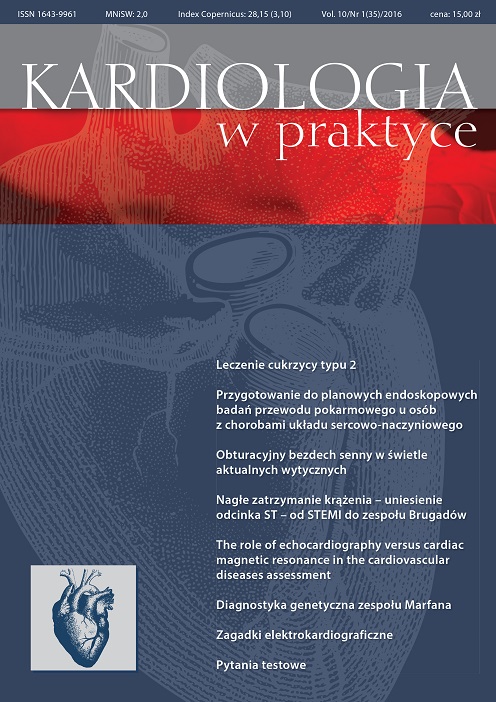Przygotowanie do planowych endoskopowych badań przewodu pokarmowego u osób z chorobami układu sercowo-naczyniowego Artykuł przeglądowy
##plugins.themes.bootstrap3.article.main##
Abstrakt
Osoby z chorobami układu sercowo-naczyniowego przyjmują wiele preparatów wpływających na wartość ciśnienia tętniczego czy wolemię. Istotne jest prawidłowe postępowanie z takimi pacjentami zarówno podczas oczyszczania jelit przed znieczuleniem do badań endoskopowych, jak i w ich trakcie. Chorzy z tej grupy często stosują leki wpływające na właściwości krzepnięcia krwi. Znajomość podstawowych zasad dotyczących leczenia przeciwzakrzepowego u osób przed planowymi zabiegami endoskopowymi ma kluczowe znaczenie dla ich bezpieczeństwa.
Pobrania
##plugins.themes.bootstrap3.article.details##

Utwór dostępny jest na licencji Creative Commons Uznanie autorstwa – Użycie niekomercyjne – Bez utworów zależnych 4.0 Międzynarodowe.
Copyright: © Medical Education sp. z o.o. This is an Open Access article distributed under the terms of the Attribution-NonCommercial 4.0 International (CC BY-NC 4.0). License (https://creativecommons.org/licenses/by-nc/4.0/), allowing third parties to copy and redistribute the material in any medium or format and to remix, transform, and build upon the material, provided the original work is properly cited and states its license.
Address reprint requests to: Medical Education, Marcin Kuźma (marcin.kuzma@mededu.pl)
Bibliografia
2. Gerson L.B., Gage B.F., Owens D.K., Triadafilopoulos G.: Effect and outcomes of the ASGE guidelines on the periendoscopic management of patients who take anticoagulants. Am. J. Gastroenterol. 2009; 95: 1717-1724.
3. Boustière C., Veitch A., Vanbiervliet G. et al.: Endoscopy and antiplatelet agents. European Society of Gastrointestinal Endoscopy (ESGE) Guideline. Endoscopy 2011; 43: 445-458.
4. Amornyotin S.: Sedation-related complications in gastrointestinal endoscopy. World. J. Gastrointest. Endosc. 2013; 5: 527-533.
5. Becker D.E., Haas D.A.: Recognition and management of complications during moderate and deep sedation. Part 2: cardiovascular considerations. Anesth. Prog. 2011; 58: 126-138.
6. Tang D.M., Simmons K., Friedenberg F.K.: Anti-Hypertensive Therapy and Risk Factors Associated with Hypotension during Colonoscopy under Conscious Sedation. J. Gastrointestin. Liver Dis. 2012; 21: 165-170.
7. Nelson D.B., Barkun A.N., Block K.P. et al.: Technology status evaluation report. Colonoscopy preparations. Gastrointest. Endosc. 2001; 54: 829-832.
8. DiPalma J.A., Wolff B.G., Meagher A., Cleveland M.: Comparison of reduced volume versus four liters sulfate-free electrolyte lavage solutions for colonoscopy colon cleansing. Am. J. Gastroenterol. 2003; 98: 2187-2191.
9. Goldman J., Reichelderfer M.: Evaluation of rapid colonoscopy preparation using a new gut lavage solution. Gastrointest. Endosc. 1982; 28: 9-11.
10. Turnage R.H., Guice K.S., Gannon P., Gross M.: The effect of polyethylene glycol gavage on plasma volume. J. Surg. Res. 1994; 57: 284-288.
11. Parikh K., Weitz H.: Can a bowel preparation exacerbate heart failure? Cleve. Clin. J. Med. 2011; 78: 157-160.
12. Granberry M.C., White L.M., Gardner S.F.: Exacerbation of congestive heart failure after administration of polyethylene glycol-electrolyte lavage solution. Ann. Pharmacother. 1995; 29: 1232-1235.
13. Curran M.P., Plosker G.L.: Oral sodium phosphate solution: a review of its use as a colorectal cleanser. Drugs 2004; 64: 1697-1714.
14. Connor A., Tolan D., Hughes S. et al.: Consensus guidelines for the safe prescription and administration of oral bowel-cleansing agents. Gut. 2012; 61: 1525-1532.
15. Kwok A., Faigel D.O.: Management of anticoagulation before and after gastrointestinal endoscopy. Am. J. Gastroenterol. 2009; 104: 3085-3097.
16. Whitson M.J., Dikman A.E., von Althann C. et al.: Is gastroduodenal biopsy safe in patients receiving aspirin and clopidogrel?: a prospective, randomized study involving 630 biopsies. J. Clin. Gastroenterol. 2011; 45: 228-233.
17. Anderson M.A., Ben-Menachem T., Gan. S.I. et al.; ASF Standards of Practice Committee: Management of antithrombotic agents for endoscopic procedures. Gastrointest. Endosc. 2009; 70: 1060-1070.
18. Hui A.J., Wong R.M., Ching J.Y. et al.: Risk of colonoscopic polypectomy bleeding with anticoagulants and antiplatelet agents: analysis of 1657 cases. Gastrointest. Endosc. 2004; 59: 44-48.
19. Gandhi S., Narula N., Mosleh W. et al.: Meta-analysis: colonoscopic post-polypectomy bleeding in patients on continued clopidogrel therapy. Aliment. Pharmacol. Ther. 2013; 37: 947-952.
20. Gerson L.B., Triadafilopoulos G., Gage B.F.: The management of anticoagulants in the periendoscopic period for patients with atrial fibrillation: a decision analysis. Am. J. Med. 2004; 116: 451-459.
21. Baron T.H., Kamath P.S., McBane R.D.: New anticoagulant and antiplatelet agents: a primer for the gastroenterologist. Clin. Gastroenterol. Hepatol. 2014; 12: 187-195.
22. Desai J., Granger C.B., Weitz J.I., Aisenberg J.: Novel oral anticoagulants in gastroenterology practice. Gastrointest. Endosc. 2013; 78: 227-239.
